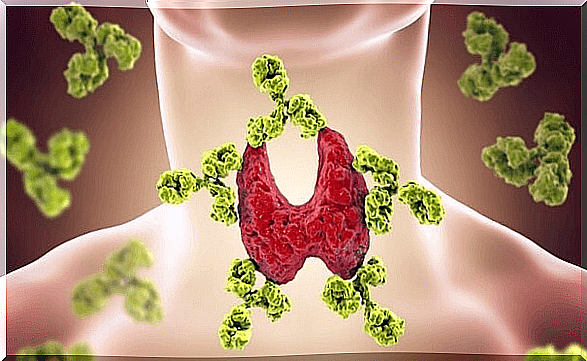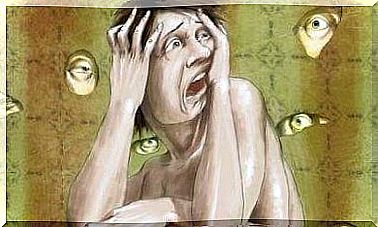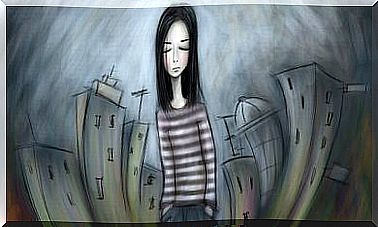Depression In Patients With Thyroid Disorder

Although they are separate diseases, the relationship between a thyroid disorder and the risk of suffering from depression has been known for some time. Thus, a common fact is that patients with hypothyroidism suffer a decline, discouragement and apathy to the point of presenting a depressive state because of this hormonal change so common in the population.
A few years ago an interesting article in Psychology Today magazine warned of a fact that should invite us to reflect. Dr. Amir A. Afkhami, a psychiatrist at George Washington University, pointed out that behind many mental problems may be a simple thyroid problem.
It is striking how this butterfly-shaped organ, just over 20 grams, affects so much our metabolism, internal balance and well-being. Any small change results in a more or less evident physical symptomatology. However, it is also known that there are patients with psychotic disorders linked to hypothyroidism.
All of this forces us to bear in mind that, when it comes to psychiatric problems, it is necessary to rule out possible alterations in the thyroid in advance. In fact, Dr. Afkhami points out that this kind of oversight can lead to very tragic situations in which some people go through a series of treatments and therapies until, finally, the real trigger is discovered: a thyroid disorder.

Thyroid disorder, a very common problem
According to a 2010 study on the prevalence of thyroid disease in the United States, nearly 10% of the population had an as-yet-undetected thyroid disorder. The incidence was even more notable in women than in men, and in this percentage, a good part of them had depressive disorder.
In other words, as curious as it may seem, there are patients who follow a treatment for depression without getting improvements or changes due to not receiving the proper diagnosis. It should be noted that, in addition to depressive symptoms, high anxiety is also common. Thus, these two features are indicated in a diagnosis known as subclinical hypothyroidism.
Interestingly, this clinical reality has been known since 1825, when it was described as a “nervous effect” of thyroid disorders. This information is also important to remember since, as explained in the Journal Thyroid Research, nearly 40% of people who have an underactive thyroid or hypothyroidism are at risk for depression at some point.

Let’s look at the symptoms that can be caused by subclinical hypothyroidism:
- Dry skin.
- Loss of hair.
- Tiredness.
- Memory and concentration problems.
- Diarrhea.
- Weight gain.
- Feeling of cold even in summer.
- Increased bad cholesterol or LDL.
- Discouragement.
- Difficulty performing the simplest tasks.
- Frequent irritation and bad mood.
- Vulnerability, negative and fatalistic thoughts.
- Fertility issues.
Subclinical hypothyroidism occurs mainly in women, being more frequent as menopause is reached.
How is subclinical hypothyroidism treated?
We already know that there is a relationship between a thyroid disorder and our mood. It is usually in subclinical hypothyroidism that depression is most often seen as the most obvious symptom, along with those mentioned above. However, the question that we undoubtedly have in mind is whether all this reality, all these signs, can be treated.
The answer is yes, there is treatment and the answer is generally very positive. A study carried out at Anhui University (China) shows that after six months of treatment with levothyroxine (the synthetic version of thyroid hormone), patients show a clear improvement.
- Their cognitive processes improve, they can focus again on their tasks, their memory goes back to what it used to be, they feel motivated to organize themselves, set goals and objectives…
- On the other hand, there is an important aspect that we must take into account: if a person suffers from subclinical hypothyroidism and also demonstrates to have an associated depressive disorder, he will not get any improvement with antidepressants.

Experts warn that not only are they not helpful in these cases, they also have adverse side effects: insomnia, weight gain, and a more troubled and negative emotional state. In other words, as we pointed out at the beginning, it is necessary for every doctor who has a patient with depression in front of him to analyze first whether or not this disorder is associated with a hormonal problem.
If this analysis is not carried out, there may be people who receive the wrong treatment, a clinical approach that further aggravates their personal reality. We can conclude by saying that levothyroxine works, it is effective and after months the progress is remarkable in all aspects: weight loss, stronger hair, greater optimism and a feeling of well-being.
Let us not neglect our endocrine health. Although we sometimes say that “we are what we think and feel”, a little nuance must be added: we are also our hormones, and their correct balance ensures our well-being.









